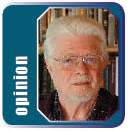 By Ken McCormack
By Ken McCormack
For Earth Day, April 22, let’s vow to take responsibility. Our careless behavior has changed Earth much faster than predicted. We are living through a global crisis, and the United States is largely responsible. There are good economic reasons, of course, to deny what has happened. ExxonMobil is recording higher profits than ever. Expensive disinformation campaigns are spreading doubt. Governments and corporations are urging “more growth.†That is, “more for us!†But in our hearts we know. Endless growth is impossible, and its pursuit is immoral.
Climate Change Creating More Refugees Than War
Energy comes from the sun; oil is stored sun energy. Fossil fuel (unnaturally) now supports seven – going on 10 – billion people. In 1830, when oil was discovered, the population was one billion. Under normal conditions, scientists say, sun energy could support two billion (the population in 1939). What will happen to those other billions?
Well, the poor will suffer most. Waste, pollution and excessive wealth are forms of violence. As they rise, so do hunger, disease, and poverty. Wars in Africa are being fought over limited resources. Climate change is creating more refugees than war. Unprecedented storms are destroying farms and displacing millions. Rising seas will soon put 650 million people in peril — including those on the Oregon Coast.
These prospects call for a deep change in our behavior — a daunting challenge that sounds impossible. But we can do it. We must. Remember the spirit of World War II? We rose as one unselfish nation to make necessary sacrifices. Now is a time like that.
Science and Religion Agree About Climate Change
Until recently, most religions accepted the common view that people are by nature competitive and selfish. The theme is continually repeated in books and movies. Humans are separate and superior. Nature is here to serve us. Scriptures of the world, including the Bible, however, often contradict this view. So does modern science. Anthropologist Robert Sussman recently told Smithsonian Magazine that, “The ultimate goal of evolution is to reach an ecological equilibrium and avoid competition and aggression.â€Â Science and religion agree.
We are nature. Destruction of our environment is self-destruction. Fungi, trees, plants and animals, including humans, are systems — not separate, independent individuals. Rich alliances and balanced relationships make life possible.
True, Congress will be going to work in canoes before they pass meaningful legislation. But we don’t need to wait for them.
The scientific theory of Emergence demonstrates that social creatures like us — fungi, ants, bees, herd animals — are bottom-up creatures, not top-down. When we relate to one another as equals, we can accomplish amazing solutions. Even green slime can join in a group intelligence that finds the shortest route through a maze!
New Beginning
If green slime, why not Green America? It’s spring! The end always leads to a new beginning. Individuals are busy installing solar panels, tilling community gardens and conducting energy audits. They are riding bicycles, driving less, eating less meat, buying locally, and changing light bulbs.
Almost all Christian denominations have developed programs to protect God’s beloved creation. Organizations like Green Faith and Earth Ministry are reaching out to spiritual and secular groups. Thousands of small groups all over the world are working together — with love and hope, with reverence and service.
“The heart of our problem,†one theologian puts it, “is that when we look out upon the world we see a stockpile of ‘natural resources’ rather than a manifestation of God’s love, provision and concern.â€Î¦
Ken McCormack, a board member of Peace Village Inc. and former Oregon PeaceWorks board member, is the author of the book Hail Holy Light.
